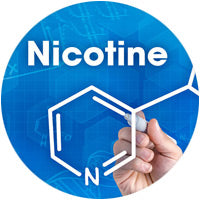An alarming amount of confusion seems to persist about the safety of nicotine. Due to its association with traditional cigarettes, many people still maintain the misconception that nicotine, rather than tobacco, is the culprit behind the many illnesses caused by smoking. But when you take a look at the science, this may not even be true; in fact, increasing evidence suggests that nicotine may actually help doctors treat neurological disorders such as depression, Alzheimer’s disease and Parkinson’s disease.
Could Nicotine Be The Next Wonder Drug?

Nicotine occurs naturally in tobacco, and other vegetation such as eggplants and potatoes, but it can also be synthetically produced. It can be absorbed through the skin, mucous membranes in the mouth or the air sacs in the lungs. No matter how nicotine is consumed, it enters the bloodstream and travels to the brain where it binds to cholinergic receptors. Some governments around the world classify nicotine as poison because it can be toxic when ingested in large quantities in its pure form; however, no one drinks pure nicotine, so calling nicotine “poisonous” might be a little misleading. When smoking or chewing tobacco, users are consuming more chemicals than just nicotine, many of which are associated with cancer and other illnesses. Research on nicotine by itself, however, has revealed some potential therapeutic benefits.
The Connections Between Nicotine and Mental Health

In 2012, researchers at Vanderbilt University tested the effects of nicotine patches on non-smoking patients with mild cognitive impairment, which is often a precursor to Alzheimer’s disease. Half of participants wore a 15mg nicotine patch everyday for six months while the other half wore a placebo patch for the same amount of time. Tests measuring memory, attention span and speed of cognitive processing were given to all patients before and after treatment. Those who had the placebo performed about the same in both rounds of testing, but those who had nicotine showed substantial gains in all areas. Dr. Paul Newhouse, the study’s main author, concluded that the research “provides strong justification for further research into the use of nicotine for people with early signs of memory loss.”
Nicotine may also be an effective antidepressant; researchers at Duke University found that nicotine patches can reduce symptoms in depressed patients. They attributed their findings to nicotine’s ability to stimulate dopamine and serotonin release in the brain. Deficiencies in these two neurotransmitters are often linked to depression.
Dopamine also plays a role in locomotion, which is why nicotine is being investigated as a treatment for Parkinson’s disease. As far back as 1979, a researcher at UCLA discovered that nicotine increases levels of dopamine in the striatum, the part of the brain responsible for planning and controlling movement. Recent research on fruit flies at the Arizona College of Osteopathic Medicine led the head researcher to announce, “Nicotine treatment reduces or, in some instances, rescues different aspects of the Parkinson’s-associated phenotype when administered early.”
Because both Alzheimer’s and Parkinson’s increase oxidative stress, another study looked into nicotine’s use as an antioxidant. The researchers concluded that, “The beneficial/protective effects of nicotine in both Parkinson’s disease and Alzheimer’s disease may be, at least partly, due to antioxidant mechanisms.” The same study found that nicotine improved memory retention in rats. Another study on rodents suggests that nicotine boosts available levels of intracellular calcium, which can improve cellular survival. While this data is not an endorsement to start using nicotine like a multivitamin, it can help researchers develop ways to tap into nicotine’s full therapeutic potential.
How Addictive is Nicotine?

Debate surrounding nicotine’s addictive properties is now emerging thanks to findings such as those recently published in the peer-reviewed journal Tobacco Control. The authors of this study note that, “Nicotine is known as the drug that is responsible for the addictive behavior of tobacco users, but it has poor reinforcing effects when administered alone.” They investigated the addictive properties of pyrazines, one of the many additives commonly found in cigarette tobacco, and found that “such additives may enhance dependence by helping to optimize nicotine delivery and dosing.” In other words, nicotine alone doesn’t cause cigarette addiction, but the combination of nicotine and other additives along with the delivery method are the true culprits. It is also worth noting that no signs of withdrawal have been documented in humans or other animals after being administered nicotine for therapeutic purposes.
Nicotine in Tobacco vs. Nicotine in E-Cigs

When smoking a tobacco cigarette, nicotine, along with hundreds of other chemicals, gets released through combustion. E-cigs, on the other hand, heat a solution of nicotine in a medium such as propylene glycol to produce nicotine in vapor form. A comprehensive overview of literature comparing nicotine delivery via e-cigs and tobacco cigarettes revealed that e-cigs deliver less nicotine per puff than traditional cigarettes.Furthermore, many e-cig companies such as White Cloud allow users to control their nicotine intake with a selection of nicotine strengths, while traditional cigarettes offer no options to control the amount of nicotine delivered.
The Future of Nicotine

With the latest evidence suggesting electronic cigarettes are 95% less harmful than tobacco cigarettes, combined with the research findings of the therapeutic benefits of nicotine, it may be safe to say there is a brighter future for both e-cigs and nicotine. Perhaps e-cigs may even one day be prescribed to treat neurological disorders. This idea may not be so far-fetched when considering the fact that studies have yet to prove any negative side effects of e-cigs, compared to the long list of side effects that accompany the prescription medications currently used to treat such disorders. As a result, the concept of nicotine as a wonder drug should bring a sigh of relief to those deemed to be “nicotine addicts” as the research continues to prove nicotine may not be the enemy traditional cigarettes have portrayed it to be.






